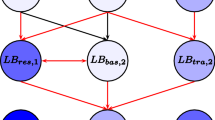Abstract
This paper considers the problem of scheduling a given number of jobs on a single machine to minimize the sum of maximum earliness and maximum tardiness when sequence-dependent setup times exist (1∣ST sd ∣ET max). In this paper, an optimal branch-and-bound algorithm is developed that involves the implementation of lower and upper bounding procedures as well as three dominance rules. For solving problems containing large numbers of jobs, a polynomial time-bounded heuristic algorithm is also proposed. Computational experiments demonstrate the effectiveness of the bounding and dominance rules in achieving optimal solutions in more than 97% of the instances.



Similar content being viewed by others
References
Allahverdi A, Gupta JND and Aldowaisan T (1999). A review of scheduling research involving setup considerations. Omega 27: 219–239.
Amin-Nayeri MR and Moslehi G (2000). Optimal algorithm for single machine sequencing to minimize early/tardy cost. J Esteghlal. Isfahan University of Technology 1: 35–48.
Baker KR and Scudder GD (1990). Sequencing with earliness and tardiness penalties: A review. J Opl Res 38: 22–36.
Das SR, Gupta JND and Khumawala BM (1995). A saving index heuristic algorithm flow shop scheduling with sequence dependent set-up times. J Opl Res Soc 46: 1365–1373.
Davis JS and Kanet JJ (1993). Single-machine scheduling with early and tardy completion costs. Nav Res Logist 40: 85–101.
Fry TD, Armstrong RD and Blackstone JH (1987). Minimizing weighted absolute deviation in single machine scheduling. IIE Trans 9: 445–450.
Garey MR, Tarjan RE and Wilfong GT (1988). One-processor scheduling with symmetric earliness and tardiness. Math Opns Res 13: 330–348.
Kanet JJ and Sridharan V (2000). Scheduling with inserted idle time: Problem taxonomy and literature review. J Opl Res 48: 99–110.
Kim YD and Yano CA (1994). Minimizing mean tardiness and earliness in single-machine scheduling problems with unequal due dates. Nav Res Logist 41: 913–933.
Laguna M (1999). A heuristic for production scheduling and inventory control in the presence of sequence-dependent setup times. IIE Trans 31: 125–134.
Liu C and Chang S (2000). Scheduling flexible flow shops with sequence-dependent setup effects. IEEE T Robotic Autom 16 (4): 408–419.
Luh PB, Gou L, Zhang Y, Nagahora T, Tsuji M, Yoneda K, Hasegawa T, Kyoya Y and Kano T (1998). Job shop scheduling with group dependent setups, finite buffers, and long time horizon. Ann Opns Res 76: 233–259.
Luo X and Chu C (2007). A branch-and-bound algorithm of the single machine schedule with sequence-dependent setup times for minimizing maximum tardiness. Eur J Opl Res 180: 68–81.
Mahnam M and Moslehi G (2009). A branch-and-bound algorithm for minimizing the sum of maximum earliness and tardiness with unequal release times. Eng Optimiz 41: 521–536.
Panwalkar SS, Dudek RA and Smith ML (1973). Sequencing research and the industrial scheduling problem. In: Elmaghraby SE (ed). Symposium on the Theory of Scheduling and its Applications. Springer-Verlag: Berlin, pp 29–38.
Schaller J (2007a). A comparison of lower bounds for the single-machine early/tardy problem. Comput Opns Res 34: 2279–2292.
Schaller J (2007b). Scheduling on a single machine with family setups to minimize total tardiness. Int J Prod Econ 105: 329–344.
Schaller J and Gupta JND (2008). Single machine scheduling with family setups to minimize total earliness and tardiness. Eur J Opl Res 187: 1050–1106.
Sourd F (2005). Earliness–tardiness scheduling with setup considerations. Comput Opns Res 32: 1849–1865.
Sourd F (2006). Dynasearch for the earliness–tardiness scheduling problem with release dates and setup constraints. Opns Res Lett 34: 591–598.
Tavakkoli-Moghaddam R, Moslehi G, Vasei M and Azaron A (2005). Optimal scheduling for a single machine to minimize the sum of maximum earliness and tardiness considering idle insert. J Appl Math Comput 167: 1430–1450.
Tavakkoli-Moghaddam R, Moslehi G, Vasei M and Azaron A (2006). A branch-and-bound algorithm for a single machine sequencing to minimize the sum of maximum earliness and tardiness with idle insert. J Appl Math Comput 174: 388–408.
Wisner JD and Siferd SP (1995). A survey of LIS manufacturing practices in make-to-order machine shops. Prod Inventory Mngt J : 11–17.
Yano CA and Kim YD (1991). Algorithms for a class of single machine weighted tardiness and earliness problems. Eur J Opl Res 52: 161–178.
Author information
Authors and Affiliations
Corresponding author
Rights and permissions
About this article
Cite this article
Nekoiemehr, N., Moslehi, G. Minimizing the sum of maximum earliness and maximum tardiness in the single-machine scheduling problem with sequence-dependent setup time. J Oper Res Soc 62, 1403–1412 (2011). https://doi.org/10.1057/jors.2010.94
Received:
Accepted:
Published:
Issue Date:
DOI: https://doi.org/10.1057/jors.2010.94




